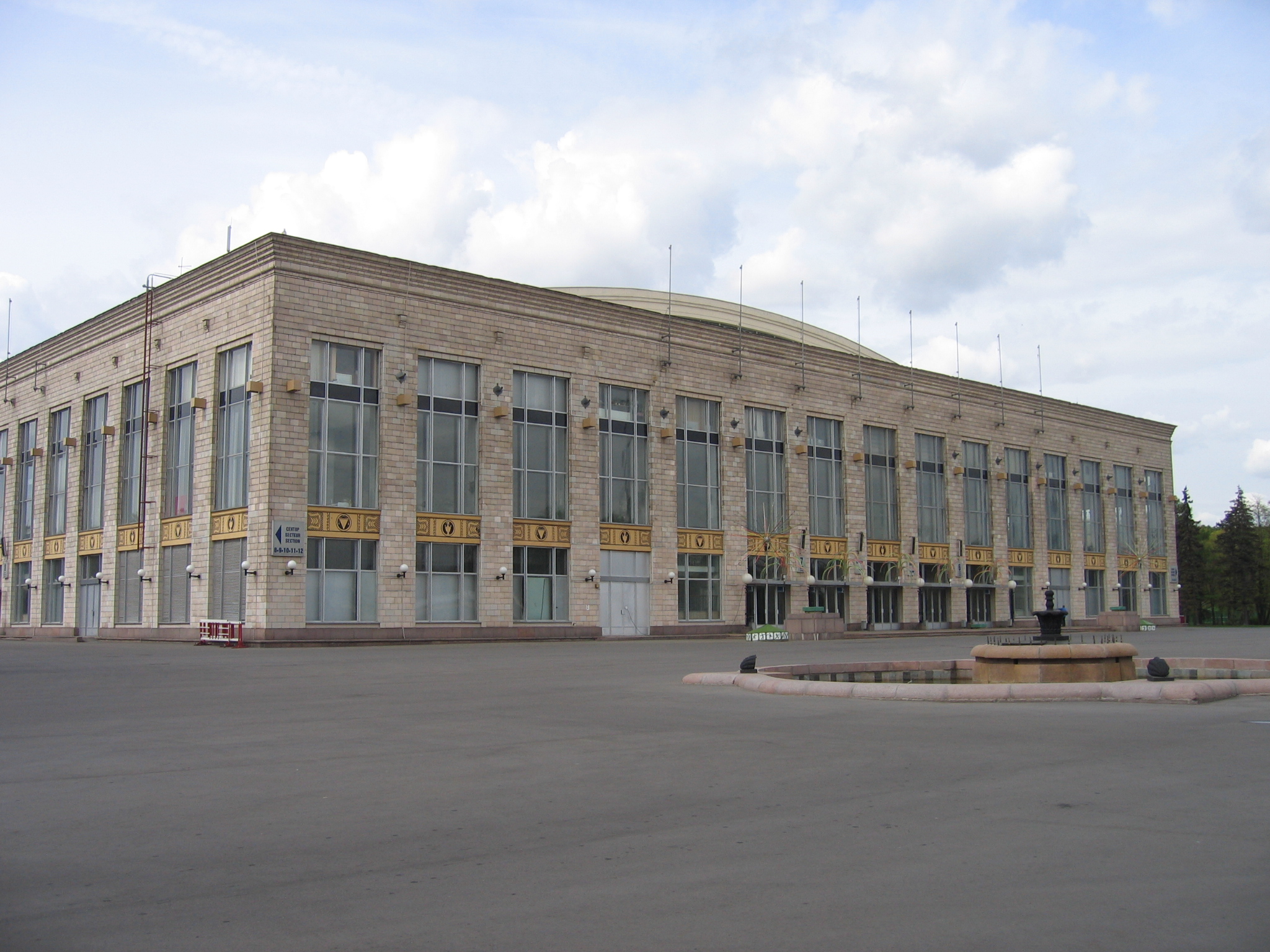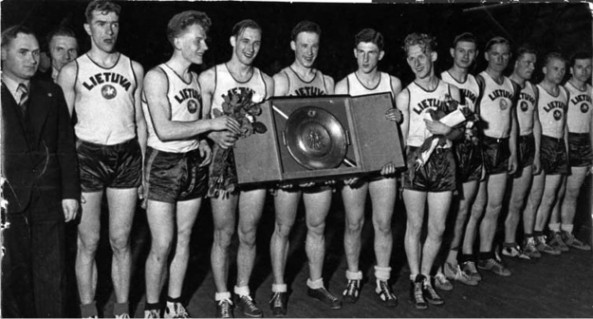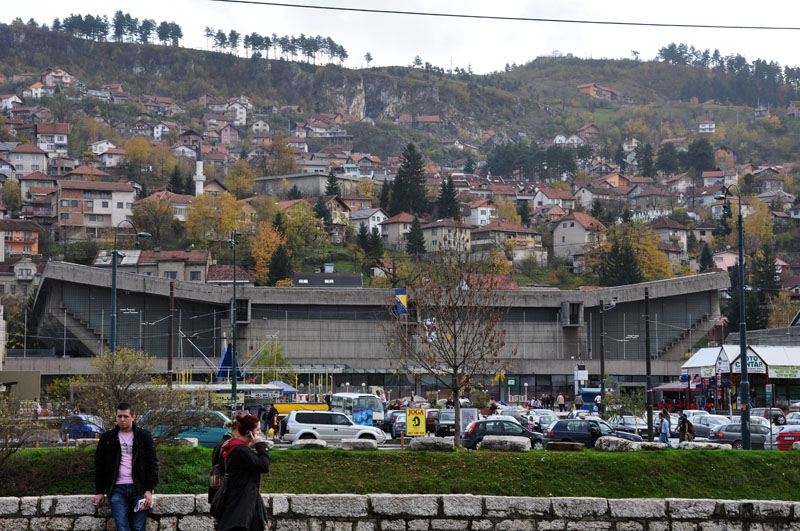|
Trajko Rajković
Trajko Rajković ( sr-cyr, Трајко Рајковић; 7 December 1937 – 27 May 1970) was a Yugoslav professional basketball player. He represented Yugoslavia internationally. Playing career Rajković played for OKK Beograd, during their so-called "Golden Era", in the late 1950s, and the first half of the 1960s, in the Yugoslav First League. Some of his teammates were: Radivoj Korać, Miodrag Nikolić, Bogomir Rajković, Slobodan Gordić and, Milorad Erkić. OKK Beograd's head coaches during that time were, Borislav Stanković and Aleksandar Nikolić, and the club's sports director at the time was Radomir Šaper. In that period, the club won three Yugoslav League championships, and two Yugoslav Cups. Rajković went to Italy in 1967, where he played two seasons, with Libertas Livorno and Reyer Venezia, of the Lega Basket Serie A. Rajković was the best scorer of the Italian League's 1967– 68 season, with 521 total points scored. National team career Rajković played ... [...More Info...] [...Related Items...] OR: [Wikipedia] [Google] [Baidu] |
Yugoslavia National Basketball Team
The Yugoslavia men's national basketball team ( sh-Latn-Cyrl, separator=" / ", Košarkaška reprezentacija Jugoslavije, Кошаркашка репрезентација Југославије; sl, Jugoslovanska košarkarska reprezentanca; mk, Кошаркарска репрезентација на Југославија) represented the Socialist Federal Republic of Yugoslavia from 1943 until 1992 in international basketball, and was controlled by the Basketball Federation of Yugoslavia. After World War II, the team steadily improved their rankings and came to be one of the dominant forces of world basketball in the 1970s and the 1980s, along with the United States and Soviet Union, capturing five Olympic medals and eight World Cups, thirteen medals in total, along with another thirteen on the continental level at EuroBasket. Eleven FIBA Hall of Fame members emerged from the Yugoslav national team: Krešimir Ćosić, Drazen Dalipagic, Ivo Daneu, Mirza Delibašić, Vlade ... [...More Info...] [...Related Items...] OR: [Wikipedia] [Google] [Baidu] |
1960 Yugoslav First Basketball League
Teams Classification The winning roster of OKK Beograd: * Miodrag Nikolić * Slobodan Gordić * Radivoj Korać * Dušan Gajin * Trajko Rajković * Slobodan Miloradović * Ljubomir Lucić * Frane Bosiočić * Bogomir Rajković * Bruno Pavelić * Dragutin Tošić * Milorad Erkić * Branko Kosović * Vojislav Jovanović * Marko Marković Coach: Borislav Stanković Scoring leaders # Radivoj Korać (OKK Beograd) – ___ points (37.0 ppg) # ??? # ??? Qualification in 1960-61 season European competitions FIBA European Champions Cup * OKK Beograd Omladinski košarkaški klub Beograd ( sr-cyr, Омладински кошаркашки клуб Београд), commonly referred to as OKK Beograd, is a men's professional basketball club based in Belgrade, Serbia. They are currently competi ... (champions) References {{Basketball in Yugoslavia Yugoslav First Basketball League seasons ... [...More Info...] [...Related Items...] OR: [Wikipedia] [Google] [Baidu] |
EuroBasket 1969
The 1969 FIBA European Championship, commonly called FIBA EuroBasket 1969, was the sixteenth FIBA EuroBasket regional basketball championship, held by FIBA Europe. First round Group A – Caserta Group B – Naples Knockout stage Places 9 – 12 in Naples Places 5 – 8 in Naples Places 1 – 4 in Naples Finals – all games in Naples Final standings # # # # # # # # # # # # Awards Team rosters 1. Soviet Union: Sergei Belov, Alexander Belov, Modestas Paulauskas, Gennadi Volnov, Priit Tomson, Anatoly Polivoda, Zurab Sakandelidze, Vladimir Andreev, Aleksander Kulkov, Aleksander Boloshev, Sergei Kovalenko, Vitali Zastukhov (Coach: Alexander Gomelsky) 2. Yugoslavia: Krešimir Ćosić, Ivo Daneu, Nikola Plećaš, Vinko Jelovac, Damir Šolman, Rato Tvrdić, Ljubodrag Simonović, Trajko Rajković, Dragutin Čermak, Dragan Kapičić, Vladimir Cvetković, Zoran Marojević (Coach: Ranko Žeravica) 3. Czechoslovakia: Jiří Zídek Sr., Vladi ... [...More Info...] [...Related Items...] OR: [Wikipedia] [Google] [Baidu] |
EuroBasket 1965
The 1965 FIBA European Championship, commonly called FIBA EuroBasket 1965, was the fourteenth FIBA EuroBasket regional basketball championship, held by FIBA Europe. Venues Results First round Group A – Moscow Group B – Tbilisi Places 13 – 16 Places 9 – 12 Places 5 – 8 Places 1 – 4 Finals Final standings # # # # # # # # # # # # # # # # Awards Team rosters #Soviet Union: Gennadi Volnov, Modestas Paulauskas, Jaak Lipso, Armenak Alachachian, Aleksander Travin, Aleksander Petrov, Zurab Sakandelidze, Viacheslav Khrinin, Visvaldis Eglitis, Nikolai Baglei, Nikolai Sushak, Amiran Skhiereli (Coach: Alexander Gomelsky) #Yugoslavia: Radivoj Korać, Ivo Daneu, Petar Skansi, Slobodan Gordić, Trajko Rajković, Josip Đerđa, Nemanja Đurić, Vital Eiselt, Miloš Bojović, Dragan Kovačić, Zvonko Petričević, Dragoslav Ražnatović (Coach: Aleksandar Nikolić) #Poland: Mieczyslaw Lopatka, Bohdan Likszo, Andrzej Pstroko ... [...More Info...] [...Related Items...] OR: [Wikipedia] [Google] [Baidu] |
EuroBasket 1963
The 1963 FIBA European Championship, commonly called FIBA EuroBasket 1963, was the thirteenth FIBA EuroBasket regional basketball championship, held by FIBA Europe. Sixteen national teams affiliated with the International Basketball Federation (FIBA) entered the competition. The tournament was hosted by Poland, and held in Wrocław. First round Group A Group B Knockout stage 13th–16th place playoffs 13th–16th place playoffs 15th place playoffs 13th place playoffs 9th–12th place playoffs 9th-12th place playoffs 11th place playoffs 9th place playoffs 5th–8th place playoffs 5th-8th place playoffs 7th place playoffs 5th place playoffs Final round Semifinals ---- Bronze medal match Final Final standings # # # # # # # # # # # # # # # # Awards Team rosters 1. Soviet Union: Jānis Krūmiņš, Gennadi Volnov, ... [...More Info...] [...Related Items...] OR: [Wikipedia] [Google] [Baidu] |
EuroBasket
EuroBasket, also commonly referred to as the European Basketball Championship, is the main international basketball competition that is contested quadrennially, by the senior men's national teams that are governed by FIBA Europe, which is the European zone within the International Basketball Federation. The competition was first held in 1935. The former Soviet Union holds the record for most gold medals with a total of 14. The tournament is generally held in August or September, in the offseason of major club competitions. The current defending champion is Spain, who won the 2022 title. History Beginning The first championships was held three years after the establishment of FIBA, in 1935. Switzerland was chosen as the host country, and ten countries joined. Only one qualifying match was played between Portugal and Spain. With a complicated formula, the final would see Latvia as champions. According to the rule at the time, the winner had to hold the following games. The fo ... [...More Info...] [...Related Items...] OR: [Wikipedia] [Google] [Baidu] |
1970 FIBA World Championship
The 1970 FIBA World Championship was the 6th FIBA World Championship, the international basketball world championship for men's teams. It was hosted by Yugoslavia in Sarajevo, Split, Karlovac, Skopje and Ljubljana, from 10 to 24 May 1970. It was the first ever FIBA World Championship hosted outside South America. Competing nations Venues Preliminary round Group A Group B Group C Classification round Final round Final rankings All-Tournament Team * Krešimir Ćosić (Yugoslavia) * Sergei Belov - ( MVP) (Soviet Union) * Modestas Paulauskas (Soviet Union) * Ubiratan Pereira Maciel (Brazil) * Kenny Washington (U.S.) Top scorers (ppg) # Shin Dong-Pa (South Korea) 32.6 # Davis Peralta (Panama) 20 # Jiri Zidek Sr. (Czechoslovakia) 19.3 # Pedro Chappe Garcia (Cuba) 18.5 # Pedro Rivas (Panama) 18.5 # Lee In-Pyo (South Korea) 18 # Omar Arrestia (Uruguay) 17.7 # Luiz Cláudio Menon (Brazil) 17.3 # Bob Mol ... [...More Info...] [...Related Items...] OR: [Wikipedia] [Google] [Baidu] |
1963 FIBA World Championship
The 1963 FIBA World Championship was the 4th FIBA World Championship, the international basketball world championship for men's teams. The competition was hosted by Brazil. The Philippines was originally supposed to host the tournament but FIBA revoked hosting rights after the country refused to grant visas to players from communist countries. Brazil being the defending Champion and a previous host, fairly managed to re-host the Championship from 12 to 25 May 1963 and won the 1st back to back title with just six (6) games by seeding the well-rested host team in the final round only. Background The Philippines was supposed to host the FIBA World Championship in 1962 but FIBA revoked hosting rights after the government of then President Diosdado Macapagal, refused to grant visas to players and officials of socialists countries including Yugoslavia and the Soviet Union. The FIBA World Championship was held in 1963 in Brazil. Competing nations Suspension * FIBA suspended the orig ... [...More Info...] [...Related Items...] OR: [Wikipedia] [Google] [Baidu] |
FIBA World Championship
The FIBA Basketball World Cup, also known as the FIBA World Cup of Basketball or simply the FIBA World Cup, between 1950 and 2010 known as the FIBA World Championship, is an international basketball competition contested by the senior men's national teams of the members of the International Basketball Federation (FIBA), the sport's global governing body. It is considered the flagship event of FIBA. The tournament structure is similar, but not identical, to that of the FIFA World Cup; both of these international competitions were played in the same year from 1970 through 2014. A parallel event for women's teams, now known as the FIBA Women's Basketball World Cup, is also held quadrennially. From 1986 through 2014, the men's and women's championships were held in the same year, though in different countries. The current format of the tournament involves 32 teams competing for the title at venues within the host nation. The winning team receives the Naismith Trophy, first awarded ... [...More Info...] [...Related Items...] OR: [Wikipedia] [Google] [Baidu] |
Yugoslavian National Basketball Team
The Yugoslavia men's national basketball team ( sh-Latn-Cyrl, separator=" / ", Košarkaška reprezentacija Jugoslavije, Кошаркашка репрезентација Југославије; sl, Jugoslovanska košarkarska reprezentanca; mk, Кошаркарска репрезентација на Југославија) represented the Socialist Federal Republic of Yugoslavia from 1943 until 1992 in international basketball, and was controlled by the Basketball Federation of Yugoslavia. After World War II, the team steadily improved their rankings and came to be one of the dominant forces of world basketball in the 1970s and the 1980s, along with the United States and Soviet Union, capturing five Olympic medals and eight World Cups, thirteen medals in total, along with another thirteen on the continental level at EuroBasket. Eleven FIBA Hall of Fame members emerged from the Yugoslav national team: Krešimir Ćosić, Drazen Dalipagic, Ivo Daneu, Mirza Delibašić, Vlade ... [...More Info...] [...Related Items...] OR: [Wikipedia] [Google] [Baidu] |
Basketball At The Summer Olympics
Basketball at the Summer Olympics has been a sport for men consistently since Basketball at the 1936 Summer Olympics, 1936. Prior to its inclusion as a medal sport, basketball was held as a demonstration event in Basketball at the 1904 Summer Olympics, 1904. Women's basketball made its debut in the Summer Olympics in Basketball at the 1976 Summer Olympics, 1976. FIBA organizes both the men's and women's FIBA World Olympic Qualifying Tournaments and the Summer Olympics basketball tournaments, which are sanctioned by the International Olympic Committee, IOC. The United States is by far the most successful country in Olympic basketball, with United States men's national basketball team, United States men's teams having won 16 of 19 tournaments in which they participated, including seven consecutive titles from Basketball at the 1936 Summer Olympics, 1936 through Basketball at the 1968 Summer Olympics, 1968. United States women's national basketball team, United States women's teams ... [...More Info...] [...Related Items...] OR: [Wikipedia] [Google] [Baidu] |
Basketball
Basketball is a team sport in which two teams, most commonly of five players each, opposing one another on a rectangular court, compete with the primary objective of shooting a basketball (approximately in diameter) through the defender's hoop (a basket in diameter mounted high to a backboard at each end of the court, while preventing the opposing team from shooting through their own hoop. A field goal is worth two points, unless made from behind the three-point line, when it is worth three. After a foul, timed play stops and the player fouled or designated to shoot a technical foul is given one, two or three one-point free throws. The team with the most points at the end of the game wins, but if regulation play expires with the score tied, an additional period of play (overtime) is mandated. Players advance the ball by bouncing it while walking or running (dribbling) or by passing it to a teammate, both of which require considerable skill. On offense, players may use a v ... [...More Info...] [...Related Items...] OR: [Wikipedia] [Google] [Baidu] |




